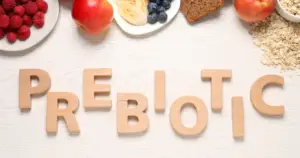What Is the Importance of Nutrition? Is It Critical for Good Health?

Nutritional wellness, a term that you must have come across when you googled “How to stay healthy?”, is less daunting than it appears.
Nutritional wellness is essentially just focusing on improving your health through diets, this would include incorporating a balanced nutritious diet in your daily life.
Importance of Nutrition
Now that we’re more acquainted with what nutritional wellness means, let’s dig deep into the importance of nutrients in our bodies.
An overall healthy diet constituting all the nutrition our body might require, will not only help the body function efficiently but will also increase your longevity.
If you’re into sports, then nutrition becomes all the more essential, because consuming the right foods can prevent sports-related injuries like muscle cramps, ligament tears, muscle fatigue, etc.
Potassium is especially known to prevent muscle cramps; so now if you find an athlete snacking on a banana, you know why! (1)
Pregnancy can be draining and exhausting, it only makes sense to provide your body with the best for all that it is doing.
Consuming all the essential nutrients like folic acid, calcium, vitamins, etc. will not only help your body cope but will also prevent any birth defects and birth complications.
It will also ensure the proper development of the fetus. (2)
New lactating mothers also have to keep a close eye on their nutrition because what you eat determines the energy, protein, nutrient, and vitamin content of your breast milk, and this, in turn, determines the health of your baby.
As a parent, it’s only natural to prioritize your baby, however, another reason for new mothers to watch their food intake is that their bodies would have undergone an immense amount of trauma and blood loss.
To avoid any deficiency of health complications that might occur after childbirth, it is important to consume a healthy diet, one which contains protein, calcium, iron, and vitamins, both for the sake of the mother’s health as well as that of the baby’s. (3)
Now when pregnancy and lactation are out of the way, watching your child’s intake becomes your primary concern.
The right nutrition at a young age will not only help in their development, but it will also help establish a good foundation for healthy eating habits and nutritional knowledge, and imparting this knowledge is one of the most important things one can do for their child! (4)
This knowledge could affect the food choices they make when they are an adolescent. During this period, the body goes through various changes; one might even say it’s evolving!
To keep up with your body, it is vital to feed it nutritious food, food that is rich in carbohydrates, fats, proteins, vitamins, and minerals.
Adolescents require twice as many nutrients than an adult because this is the period where they gain around 40% of their adult weight and 15% of their adult height! (4) (5)
Nutrition is a vast subject to cover, however, there are 6 essential nutrients that you must be aware of!
- Carbs
Carbs are short for carbohydrates, a large group of organic compounds that you find in foods, and living tissue.
Sugars, starch, and fiber are all a type of carbohydrate.
They are ideally broken down to release energy in the human body. They also fuel your brain, kidneys, heart muscles, and central nervous system.
- Protein
Proteins are essential macronutrients that are also known as the building blocks of body tissues, and muscles. It also helps in fueling the body since it can provide as much energy density as carbohydrates.
A major function of this nutrient is to help maintain your bones, muscles, cartilage, and skin. It also plays a role in various other functions of the body like digestion, oxygenation, and regulation.
- Fats
Fat is also a nutrient that helps fuel the body. It comes in several forms, saturated, monounsaturated, polyunsaturated, and trans.
Monounsaturated and polyunsaturated fats are known as the “good fats”; this is because they are good for your heart, your cholesterol, and your overall health.
The fat stored in our body helps store energy while also keeping us warm. They also absorb all the fat-soluble vitamins and help store them in our bodies.
- Vitamins

Vitamins are organic substances present in minute quantities in various foods; our bodies cannot synthesize them, and hence consumption through foods rich in vitamins is essential.
There are two types of vitamins, water-soluble and fat-soluble.
Water-soluble vitamins can not be stored in the body, and any excess will be passed out in the form of urine. Fat-soluble vitamins can be stored in the body for days and, at times, months. They are stored mainly in fatty tissues and the liver.
Vitamins are essential for the proper functioning of our body.
Specific vitamins help absorb other nutrients; vitamin C helps absorb iron from plant foods, and vitamin D helps absorb calcium. Apart from aiding in absorption, vitamins also help convert food into energy, building and maintaining our bones, teeth, muscles, skin, and hair. They also ensure the efficient functioning of our brains, eyes, nervous and immune systems.
| Vitamins | Common Names | Major Benefits |
| Vitamin A | Retinol | Protects Eyes |
| Vitamin D | Cholecalciferol | Regulating the absorption of calcium and phosphorus |
| Vitamin E | Tocopherol | Antioxidant |
| Vitamin K | Phytonadione | Used in the synthesis of various substances needed for blood clotting. |
| Vitamin B1 | Thiamine | Helps prevent complications in the brain, muscles, and nervous system. |
| Vitamin B2 | Riboflavin | Helps break down proteins, fats, and carbohydrates |
| Vitamin B3 | Niacin | Helps maintain your cholesterol levels.It also plays a vital role in the release of energy from all energy yielding nutrients. It helps in synthesizing protein, fat, DNA, and RNA. |
| Vitamin B5 | Pantothenic Acid | It helps in synthesis of cholesterol and steroid hormones. |
| Vitamin B6 | Pyridoxine | Helps the body regulate hormones, and synthesize haemoglobin. It also controls neurologic conditions, protein metabolism, and immune function. |
| Vitamin B7 | Biotin | Essential for liver metabolism |
| Vitamin B9 | Folate | Helps in cell growth and cell division , and also aids in the production of DNA and RNA |
| Vitamin B12 | Cobalamin | Helps prevent anemia |
| Vitamin C | Ascorbic Acid | Helps in growth, repair, and development of all body tissues, collagen formation, activation of certain hormones, improves immunity.It is also an antioxidant. |
- Minerals
Minerals are those elements that help our body function. They are essential for good health.
Minerals perform various functions in our body apart from helping it grow, develop, and stay healthy. They help build strong bones, transmit nerve impulses, make hormones, and even maintain a normal heartbeat.
- Water
An inorganic, transparent, taste, and odorless chemical substance, water, is as essential to our body as it is to plants.
Water helps keep our body hydrated while also regulating body temperature, and maintaining other body functions like excretion.
What we get from all of this information is that nutrition is important in all stages of life and plays a very important role in our lives.
What role in our lives you ask?
Well, a healthy diet helps improve our overall well-being. It improves the quality of our lives by enriching them with everything necessary. Protein for your muscles, calcium for your bones, and so on.
Lesser known facts of consuming the right nutrients in your diet are that it can keep your skin glowing, and can prevent any signs of aging like wrinkles and fine lines. (5)
They can also protect you from various chronic conditions like cancer. The antioxidants you receive from foods can help reduce the risk of developing cancer. (6)
It can also improve your immune system and prevent you from falling ill often. Various vitamins and minerals like vitamin A, C, D, E, Calcium, Iron, Zinc, etc play a role in doing so. (7)
If consumed right, it can also help you manage your weight. Your weight loss journey does not have to be excruciatingly hard, fix your diet and you’re halfway there!
Did you know that the right nutrition can also keep your mind happy and healthy?
Yes, it is true!
The nutrients in chicken can keep a check on the production of your happy hormones, and keep depression at bay. (8)
It can also help increase your focus. Dark chocolate, blueberries, turmeric, broccoli, etc. are all foods that can boost your memory and maintain your brain health.
Dental health, yes nutrition also plays a vital role in maintaining your oral health and limiting your visits to the dentist!
Raisins are known to keep your teeth clean and inhibit bacterial growth that can cause dental caries. (9)
Your lifespan can also be affected by your nutrient consumption. By including the right nutrients in your diet, you are increasing your chances of leading a longer and healthier life.
It is incredibly expensive to lead an unhealthy life. Without the right diet, you are prone to various kinds of illnesses, and this means an increased number of doctor visits; and that is going to take a toll on your pockets!
Eating right, and giving your body the kind of movement it requires, is the best alternative.
How to achieve great nutrition in your diet?
Now that we know how important nutrition is, let’s look at how to achieve great nutrition in your diet.
Like we discussed, nutrition is vast, and you can not expect to find all the right nutrition in one type of food. It is essential to fill your plate with various types and kinds of food.
Whole grains, fruits and vegetables, protein, dairy, and fats, and sugars. These types of food should have a place on your plate daily.
Half your plate should consist of whole grains, and the other half of fruits, veggies, and protein. Dairy, fats and sugar should also be included, but it is important to watch your intake.
What are the indicators that you follow a nutritious diet?

They say the eyes are the windows to your soul, similarly, we believe that your body is a reflection of your diet.
If you consume nutritious meals daily, then your body will portray it!
You will have a healthy physique, and you won’t just look good you will also feel good.
Your cholesterol levels and blood pressure levels will not become a cause of concern, and neither will your bowel movements.
You will have healthy-looking skin and hair, and great energy levels during the day.
Nutrition and Supplementation
Sometimes, due to various external factors, you may not find all the required nutrients from your diet.
You may be a vegetarian and not find enough sources of vitamin B12, you may be lactose intolerant and have trouble consuming dairy products.
Other times, even though you are eating right, your body might just not be able to absorb all of the nutrients because they may not be bioavailable.
So what do you do?
You turn to supplements. Supplements are the most bioavailable form of nutrients. They fulfill your body’s requirement of various nutrients, and you do not even have to go an extra mile for it!
However, you should always consult a doctor before taking any supplements. It is vital to keep your doctor or nutritionist in the loop of the changes you make in your diet.
Conclusion
Nutritional wellness is the idea of focusing on attaining better health through your diet.
Having the right diet and consuming the right foods is necessary through all stages of life, regardless of what you’re doing or what you’re not.
Nutrition is essential for various bodily functions, and 6 essential nutrients,
- Proteins
- Carbs
- Fats
- Vitamins
- Minerals and
- Water
All are required by the body for different purposes, but together they can give you a better quality of life.
The various benefits the right nutrition can bring are
- Improved well being
- Healthy skin and hair
- Improved immunity
- Protection against chronic conditions
- Improved mental well being
- Improved dental health, and
- Increased longevity
These benefits will be a result of you fixing your diet. You can include whole grains, fruits and vegetables, protein, dairy, and fats and sugars, to make a change in your diet and receive all the right nutrients.
Your body will show signs of improved health once it starts receiving the right nutrition.
However, when it is not possible to receive certain nutrients through your diet, you can turn to supplements.
Always consult a doctor before doing so.
FAQ
- What is the relationship between nutrition and exercise?
As you exercise, your body starts to require an increased amount of energy.
The number of calories you require will also change with time depending on your results.
The baseline is that nutrition and exercise go hand in hand. Without the right nutrition, your exercising falls flat and you will not achieve your desired results.
- What is the difference between food and nutrition?
Food is what we eat and consume, nutrition is part of the food that our body can absorb and use for better functioning.
However, certain nutrients you can not receive from food, and at times like that, you turn to supplements.
- What is the most important nutrient?
There is not one nutrient that is the “most important”. You need to consume a mix of all the nutrients to be benefitted.
- What Vitamins do we need daily?
It is ideal to consume all the vitamins daily.
However, since this might not be possible through your diet, you can consider multivitamins.
That way, you will be receiving all the vitamins that your body requires in a day.
- What are the benefits of eating fruits every day?
Fruits are an excellent source of vitamins and minerals. They are also rich in fiber and antioxidants.
Consuming fruits daily will boost your body’s antioxidants, and improve your body’s functioning.
![Blue Foods List [with pictures]](https://keevs.com/wp-content/uploads/2023/03/Blue-Foods-List-with-pictures-300x158.png)






